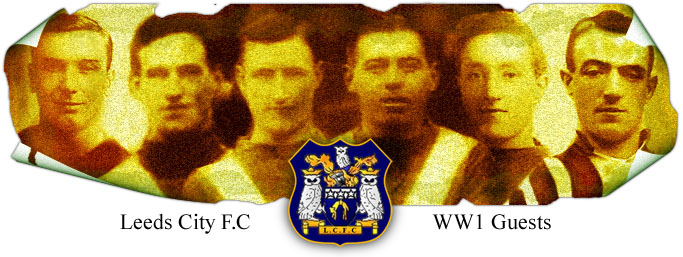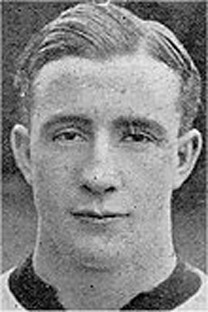

James: William Ebsworth (Billy)
1916-1916 (Leeds City War-time Guest Player Details)
Outside Left
Born: Stockton-on-Tees: 0-0-1892
Debut: v Nottingham Forest (h): 11-11-1916
Height & Weight: Unknown
Billy James was born at Stockton-on-Tees in 1892 and was a Left Winger, but also played Inside Left and Centre Forward. He started with noted Junior team, Eston
United, who had been founded in 1905 by members of the defunct Eston White Star taking on the name Normandy United. They quickly, within a couple of weeks of
foundation, changed this to Eston United. They quickly acquired a strong pedigree being runners-up in the F.A. Amateur Cup in the 1908-09 season unfortunately losing
the final to Clapton Orient at Ilford by 0-6, just before James joined the club in 1909. The club joined the Northern League at the start of the 1910-11 and became the
champions at the first time of asking, winning fifteen, drawing four and losing just three of the twenty-two game League. They went on to be runners-up once more in
Amateur Cup in the 1911-12 season going down 0-1 to Stockton in the Final replay at Ayresome Park, after drawing the Final 1-1 at the same venue. The club went on
to again win the Northern League again in a fourteen team competition in 1922-23. But James had long since departed, long before the club went defunct in 1926-27.
He had departed for First Division Middlesbrough in 1910. He made his debut on 1st April 1911 in a 0-1 home loss to Aston Villa in the League Division One. At
Ayresome Park he played twenty-four League games and scored eight goals, including one from the penalty spot and added one goal in three F.A. Cup appearances
during his three seasons there. He made three appearances in the 1910-11 season and Boro lost all three, as they went down 1-3 at Sunderland and 0-1 at Notts County.
He did not immediately claim a regular position in the team but went on to score seven goals in nineteen League games and one goal in three F.A. Cup games in the
1911-12 season. His first F.A. Cup appearance saw him score the opening goal in a 2-1 over The Wednesday at Hillsborough in the First Round on 25th January 1912
before West Ham held Boro to a 1-1 draw in the Second Round on 3rd February 1912 at Ayresome Park and completed a 2-1 victory in the replay at Upton Park five
days later. James played his first game of the 1911-12 season in a 2-0 home win over Tottenham Hotspur on 14th October 1911 and scored the second goal. He was
then a regular for most of the rest of the season, and this time he had a winning bonus in the first three games as Manchester United were beaten 4-3 at Old Trafford on
28th October 1911 and Liverpool were beaten 3-2 at Ayresome on 28th October 1911. The following week, on 4th November 1911, there were mixed emotions as
James scored the Boro goal in a 1-2 defeat at Villa Park.The following week there was a 1-1 home draw with the Magpies from Tyneside. This was followed by a similar
result at Bramall Lane against Sheffield United. He was again on the mark in the next game with the third goal in a 3-0 home win over Oldham Athletic on 25th November
1911. It was three weeks later before he featured on the scoresheet, which saw a 0-1 loss at Burnden Park, a 1-0 victory over Bradford City at Ayresomeand a 1-3 away
defeat at Woolwich Arsenal. On 23rd December 1911, he scored the first goal from the penalty spot and the second from open play as Boro disposed of Manchester
City at home by 3-1. But Christmas Day wasn't full of cheer as the 22,436 home crowd saw a 0-0 draw with Everton. James was again on the scoresheet on 30th
December 1911 as he scored the third Boro goal in a 3-3 home draw with Wearside rivals which would have excited the 18,750 attendance far more than the previous
game. He played in a 2-1 away defeat at Blackburn Rovers followed by a 1-1 home draw with the Wednesday and another four appearances before season ended with
no further goals. He made two appearances for Boro in the 1912-13 but had fallen out of favour with John Carr now in his position. His only games were on 10th February
1913 in a 2-5 defeat at Blackburn Rovers and on 2nd April 1913 in a 1-1 draw at home to Notts County. Middlesbrough, like most clubs in the North-East refused to play
after the 1914-15 season but James had already moved to Portsmouth of the Southern League on 26th May 1913 and he was on the official list of registered players for
the 1914-15 season. for the 1914-15 season. It was during the 1916-17 War-time fixtures that he played just one game as a guest for Leeds City. City were undoubtably,
one of the best teams in the country, as they had access to many fine players as guests and were to win the Midland Section of the War-time Leagues in the 1916-17 a
feat they repeated in the following season and then proved their claim to be "the best team in the land" by beating Stoke, the winners of the Lancashire Division, the other
War-time League, in a two-legged play-off. So, on the lead up to the Leeds City home game with Nottingham Forest on 11th November 1916, it was found that their usual
outside-left, Tommy Mayson, who was on the books of Grimsby Town at the time, had sustained an injury that would prevent him from playing in that game. In those
circumstances they approached James, of Portsmouth to guest in his place. With the game 1-1 at the interval, James came into his own in the second period, as reported
by the Yorkshire Post: “The City showed huge improvement in the second half, and one particularly fine rally of their forwards ended in James just missing with a shot from
the wing. James continued to be much in evidence, and Lawrenson needed to show exceptional ability in clearing two of his centres. The City attacked persistently, though
with a noticeable lack of finish and with a degree of over eagerness which caused Price in particular to miss two chances. Many corners were blocked and well cleared,
but finally it was a corner taken by Jimmy Stephenson which gave the home side the lead. The player put in a beautiful flag kick which placed the ball for Harry Sherwin to
head it direct into the corner of the net. This happened ten minutes from the finish, and in the last minute Clem Stephenson added another goal from a centre by James,
making the result Leeds City 3 Nottingham Forest 1.” In contrast, the Leeds Mercury’s JRB claimed that James “was hardly at home”, and he never appeared again for the
Peacocks. James played for Portsmouth on both sides of World War One. Portsmouth were in the Southern League and in the 1913-14 season came 9th in a twenty club
competition which they followed with a seventh place in 1914-15, before the War saw their fixtures stopped for the duration of the conflict. He was a member of Portsmouth’s
Southern League Championship winning team of 1919-20 season as they finished top of a twenty-two club Southern League Division One. This saw Portsmouth elected to
the Third Division of the Football League. He played in the club's inaugural Football League match against Swansea Town in August 1920 but he was transferred to Second
Division West Ham United in January 1921 after forty-two goals in one hundred and twenty three appearances across Southern League, Football League and FA Cup for
Portsmouth. James had come into prominence with Portsmouth in the Third Division, scoring three goals in twenty-two League appearances and also made one F.A. Cup
tie without scoring in the 1920-21 season, before signing for Second Division West Ham United in January 1921. He scored seven goals in fifty-seven appearances for The
Hammers. He made is debut on 22nd January 1921, scoring the only goal of the game in a 1-0 home win over Clapton Orient in front of a 27,000 crowd. His performances
soon ensured that he was a regular, making eighteen appearances in remaining fixtures and scored three goals. His other goals in that season came on 19th March in a 2-1
home win over Barnsley and on 30th April 1921 in a 2-1 away win at Port Vale. He spent two years in Second Division football before fading out of the top class game. In the
1921-22 season he scored four goals in thirty-six League appearances and played three F.A. Cup games without scoring. The four goals came in a 3-1 home win over Derby
County on 17th December 1921, a 1-1 draw home draw with Leeds Unitedon 28th January 1922, the only goal in a 1-0 win at Rotherham County on 25th March 1922 and
one in a 1-2 home defeat by Clapton Orient on 14th April 1922. He played his final game in a 0-2 away defeat at Fulham. Time was catching up with him and he soon found
the much younger Jimmy Ruffell was now ready to replace him and it was time to hang up his boots, having played fifty-four League games for seven goals and three more
games in the F.A. Cup. He died in 1960.
| War-time Guest Appearances | Goals |
| |
| Principal Tournament 1 | 0 |
| Subsidiary Tournament 0 | 0 |
| |
| Total 1 | 0 |